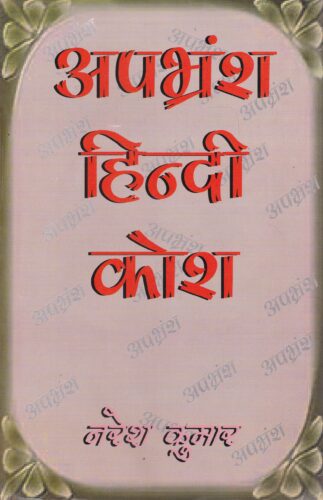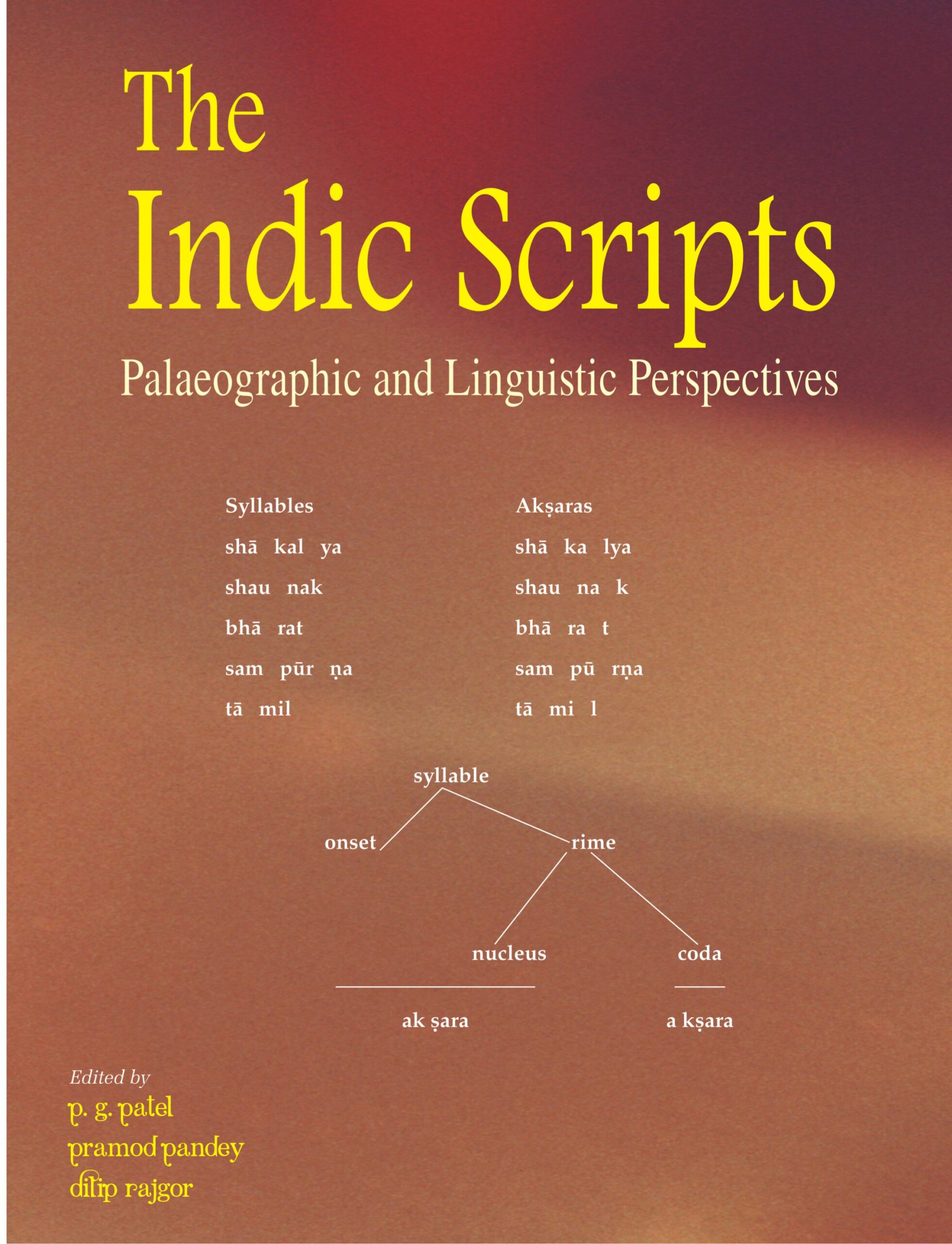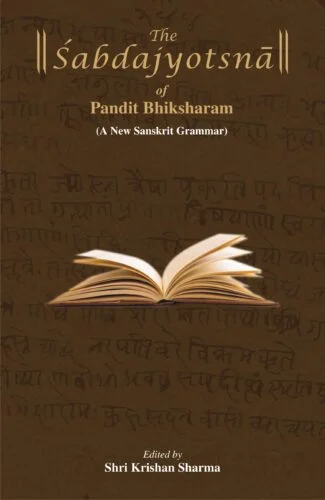

Apbharamsa Hindi Kos...
Apbharamsa Hindi Kosha
Apabhramsa-Hindi-Dictionary by: Naresh KumarThis Dictionary of Hindi Apabhramsa gives in detail the grammatical importance of words, their meanings, correct spellings, the alternate words and their various usages as mentioned by lexicographer Naresh Kumar.
₹1,500.00 Original price was: ₹1,500.00.₹1,350.00Current price is: ₹1,350.00.
ISBN: 9788124601365
Year Of Publication: 1999
Edition: 1st
Pages : xlv, 869
Language : Hindi
Binding : Hardcover
Publisher: D.K. Printworld Pvt. Ltd.
Size: 23 cm.
Weight: 1500
This Dictionary of Hindi Apabhramsa gives in detail the grammatical importance of words, their meanings, correct spellings, the alternate words and their various usages as mentioned by lexicographer Naresh Kumar.

- Sale!Linguistic Traditions of Kashmir by: Mrinal Kaul, Ashok Aklujkar,
₹1,250.00Original price was: ₹1,250.00.₹1,125.00Current price is: ₹1,125.00.The present volume mainly consists of original research papers. It is not a collection or anthology in which specialists of the different aspects of Kashmirian use or study of language were invited to write essays surveying the aspects best known to them or to produce state-of-the-art reports about the scholarly study of the aspects. An effort, however, has been made in the Introduction to provide the general background that a reader may need in order to situate the papers in the proper intellectual and historical context. The Introduction further outlines the themes that could and should be particularly explored to lead us to a fuller and sharper understanding of Kashmir’s analytical engagement with language. The appendices toward the end of the volume then complement the Introduction by presenting objective and practical information about the manuscripts etc. of works in Sanskrit. The volume could connect the results of the work done in the past with the work to be done in the future by adding to knowledge in the present because of the articles it attracted from veteran as well as upcoming researchers. The reader will find here discussions bearing upon texts, as well as discussions bearing upon the authors of texts; discussions devoted to elucidating single passages, as well as discussions exploring instances of intertextuality; and discussions exclusively addressing individual grammars, as well as discussions engaging in the relation of one grammatical school with another.
- Sale!Philosophy of Language in Classical Indian Tradition by: K.S. Prasad
₹850.00Original price was: ₹850.00.₹765.00Current price is: ₹765.00.Philosophical query into the working of language has occupied an important place in the rich tradition of thought in India since the ancient times. This book throws light on various debates in classical Indian Philosophical tradition concerning the structure of language and meaning. Papers in this book have been arranged in four groups basing on their thematic composition. The book begins with the general issues relating to language as figured in classical schools of Indian philosophy. Papers dealing with the semantic structure of language as discussed by Bhartrhari in his Vakyapadiya follow this. The next set of papers is related to some of the important semantic notions of Nyaya philosophy of language. In this respect notions like sense, reference, proper names, meaning, etc., have figured in for discussion. The last set of papers is concerned with the import of sentences wherein papers dealing with Purva-Mimamsa are included. One of the significant features of this volume is that some of the issues and problems in Indian Philosophy of language have been approached from the contemporary Western perspective with a view to explicate and evaluate them in a better way and this would be of considerable interest to scholars and students of philosophy, particularly those involved in the study of classical Indian philosophy.
- Sale!Indic Scripts by: P.G. Patel, Pramod Pandey, Dilip Rajgor,
₹1,400.00Original price was: ₹1,400.00.₹1,260.00Current price is: ₹1,260.00.This volume presents the advances in the ongoing research on Brahmi and its daughter scripts used in the present day India. It brings together two main trends: evolutionary-historical development and linguistic grounding. This is the first attempt to cross-fertilize palaeography and linguistics. The palaeographic papers cover the main issues in the decipherment of the Indus Valley script, the origin and evolution of Brahmi, and the palaeographic methods and considerations employed in the decipherment of scripts. These present different trends and arguments of writers on the origin of Brahmi as having been around the Mauryan era or at a much earlier stage, relate to broader historical and cultural issues. They also deal with the need for the use of established and more current palaeographic techniques in classifying regional and stylistic variants of scripts. The linguistic papers in the volume explore the issues of the roots of the orthographic unit aksara in Vedic phonetics, its claim as a minimal articulatory phonetic unit, and the properties of Brahmi as a generative writing system. The philosophical and linguistic underpinning of the concept aksara is shown to thread its use in the varieties of treatises, from the Vedas to phonetic texts. The papers help in providing linguistic evidence for historical accounts of the script as an invention at a given time or as an evolving evolutionary system, apart from relating the development of the script to the linguistic history of India. Palaeographers epigraphists, linguists and computational scientists, will find this volume interesting and useful.
- Sale!Sabdajyotsna of Pandit Bhiksharam by: Shri Krishan Sharma
₹250.00Original price was: ₹250.00.₹225.00Current price is: ₹225.00.Pt. Bihiksharam (18871975) composed the Sabdajyotsna with a view to teach Sanskrit grammar to an ordinary student in a simple style. The author adopts pratyahara, anuvritti, anubandha, etc. in his work to impart the abridgement on the pattern of Ashtadhyayi and Pratishakhyas. For this purpose, the author tries his best to simplify the tough process of learning Sanskrit grammar.
The sutras of the Shabdajyotsna are composed subject wise (according to prakarana) on the pattern of prakriya works. Only samjna- and sandhi-prakaranas of this work were published in 1958. The rest of the text in Devanagari remained in the form of manuscript lying unattended. The script, whatever traced, was made available to Prof. Shri Krishan Sharma for the editing purposes by his grandson. However, the samasa-prakarana and some portions of taddhita-prakarana still remain untraceable.
In spite of some minor gaps, the work deserves recognition and appreciation in the academic circle. The author of the Sabdajyotsna aimed at and indeed succeeded in fully exposing the rules of Sanskrit grammar in lucid and clear diction.
The work, a pioneering attempt of its kind, may very well be considered as a significant contribution to the tradition of Sanskrit grammar, benefiting students, teachers and researchers alike. - Sale!Sabdapramana by: Purushottama Bilimoria
₹750.00Original price was: ₹750.00.₹675.00Current price is: ₹675.00.Shabdapramana or Testimony is a formidable doctrine within Indian philosophy. A thorough investigation of this thesis is long overdue. What is shabdapramana (word as knowledge)? What is involved in hearing words? Is the understanding derived through hearing utterances direct or indirect? Does this peculiarly linguistic understanding (shabdabodha) amount to knowledge (prama), or does it depend on certain other conditions for its truth? Further, what sort of theories of meaning, understanding, and knowledge would be required to ground a successful shabdabodha as prama,> need careful attention. It is sometimes said that Indian thinkers had no particularly interesting theory of understanding. The present work sets out to address these issues issues that have engaged traditional and modern thinkers alike. Based on the classic text, Advaita Vedanta-paribhasha of Dharmarajadhvarindra (17th century), the analysis and arguments extend to the views of and criticisms from the Nyaya, Purva Mimamsa and the grammarian/linguistic schools within Indian philosophy, with a treatment of similar concerns in Western philosophy. There is a compelling thesis here that should be taken seriously in any philosophy. Long discarded as a distinct source of knowledge in Western philosophy, Testimony might be fruitfully re-examined. This could lead to mutual dialogue between philosophy and religion, and pave the way for critical metaphysics.







